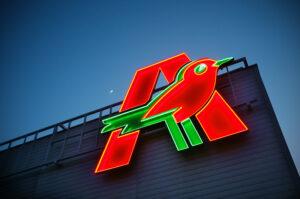Auchan takes a new direction: the hypermarket chain would take things to the next level with smaller stores
Auchan Hungary has announced a new strategy: in the coming years, the company plans to expand its local presence by opening smaller stores. The move is a response to the rapid rise of discount chains and government-imposed restrictions affecting the retail sector – as revealed in an interview with Géza Vincze, CEO of Auchan Hungary, published by Portfolio.
 Hungary’s food retail sector is undergoing significant transformation: consumers are increasingly seeking cheaper, faster, and more accessible shopping options, and discount chains are fully meeting these expectations. The growing dominance of Lidl, Aldi, and Penny has forced many market players to rethink their strategy – Auchan being the latest.
Hungary’s food retail sector is undergoing significant transformation: consumers are increasingly seeking cheaper, faster, and more accessible shopping options, and discount chains are fully meeting these expectations. The growing dominance of Lidl, Aldi, and Penny has forced many market players to rethink their strategy – Auchan being the latest.
Géza Vincze, CEO of Auchan Hungary, told Portfolio that the hypermarket chain is developing smaller store formats to adapt to changing consumer habits and shifting market realities.
The dominance of discounters
In recent years, the market share of discount retailers has been steadily increasing: from 33% in 2021 to 41% in 2024. Lidl has been the market leader in Hungary since 2020, while former dominant players – such as Tesco – have gradually lost ground.
The popularity of discount chains is not only due to low prices and quick shopping experiences but also because their business models align well with the needs of Hungarian consumers – especially in urban areas where time efficiency is key.
Government pressure and financial strain
International retail chains are facing not only intensified competition but also growing regulatory pressure. Extra taxes, the food chain supervision fee, restrictions on new store openings, and mandatory preference for Hungarian products all increase operational costs. These are compounded by market-distorting tools such as price caps, margin limits, and mandatory promotions.
Some players still manage to remain profitable: in 2024, Lidl reported revenues of HUF 1,324 billion and a profit of HUF 26.4 billion. However, most competitors posted losses: Aldi reported HUF 27.4 billion in losses, Spar HUF 24.8 billion, and Tesco HUF 10 billion.
The financial data of Hungarian-owned chains are harder to compare due to their franchise model, but a growing portion of the retail sector now depends on state subsidies – while the number of small shops continues to decline.
Smaller footprint, greater flexibility?
Auchan is responding to the new environment with a clear strategy: the company plans to open smaller-format stores that can serve local needs more quickly and flexibly. This move brings the chain closer to the discount model, while still relying on its own-brand portfolio and supplier relationships.
The goal is not only to slow down market share loss but also to reach new customer segments. These smaller shops could appear in densely populated city districts, suburban areas, and even near existing discount stores.
Shifting dynamics
Over the coming years, we can expect a growing diversification of store formats: while hypermarkets will remain part of the landscape, their importance may decline. Adaptability – in store type, pricing, and logistics – could become a key competitive edge.
Auchan’s new strategy is therefore not just about survival, but about regaining momentum in a market increasingly dominated by discount players.
Related news
A surprising trend on Women’s Day: something else, more personal, is almost essential in addition to flowers
🎧 Hallgasd a cikket: Lejátszás Szünet Folytatás Leállítás Nyelv: Auto…
Read more >Unprecedented collaboration: more than 6,000 homeless and shelter animals receive support
🎧 Hallgasd a cikket: Lejátszás Szünet Folytatás Leállítás Nyelv: Auto…
Read more >Hétéves növekedési stratégiát jelentett be az Auchan
🎧 Hallgasd a cikket: Lejátszás Szünet Folytatás Leállítás Nyelv: Auto…
Read more >Related news
(HU) Átadták a SIRHA Budapest 2026 Innovációs Termékverseny díjait
🎧 Hallgasd a cikket: Lejátszás Szünet Folytatás Leállítás Nyelv: Auto…
Read more >How does the forint exchange rate affect consumer prices?
🎧 Hallgasd a cikket: Lejátszás Szünet Folytatás Leállítás Nyelv: Auto…
Read more >HELL CITY has arrived, led by Michele Morrone
🎧 Hallgasd a cikket: Lejátszás Szünet Folytatás Leállítás Nyelv: Auto…
Read more >








